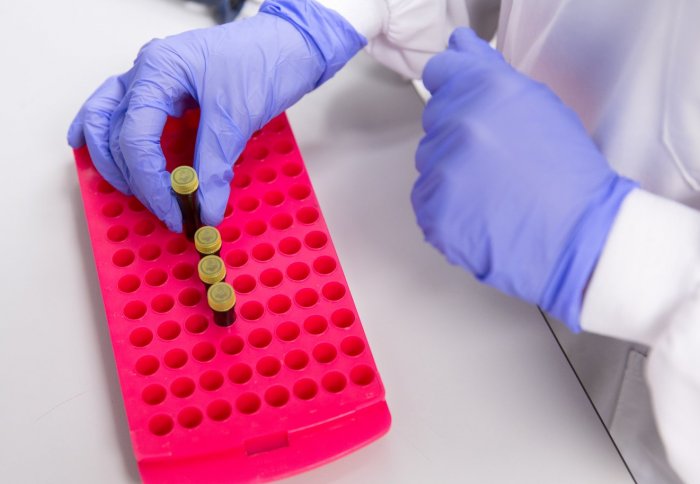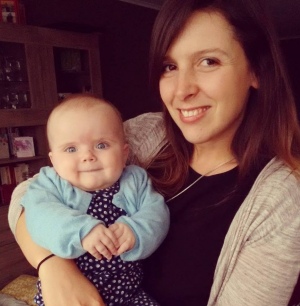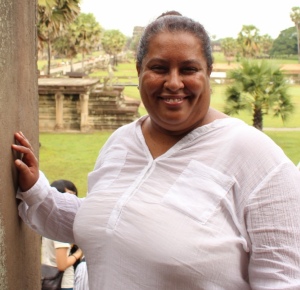Pharmacists, midwives, nutritionists and physios researching better care
by Maxine Myers

A programme to support allied healthcare professionals in their research careers enters its third year with the arrival of six new fellows.
Working in the fields of pharmacy, midwifery, nutrition and physiotherapy, the six will undertake research over the next year as part of Imperial’s Research Fellowship Scheme.
Their projects include: ensuring patients take their medication following a kidney transplant, testing a device to measure muscle strength of patients with a rare spinal cord disease, implementing a new education and diet programme to help diabetes patients on dialysis, and increasing the numbers of healthy women having their babies in birth centres or at home.
The scheme was set up in 2014 to give staff working at Imperial College Healthcare NHS Trust in allied healthcare professionals the same clinical academic training opportunities as doctors. Recipients have the opportunity to develop their research skills and experience so that they can apply for a Masters or PhD and progress in their clinical academic career.
The six fellowships are worth up to £50,000 each and are jointly funded by Imperial College Healthcare Charity and Imperial NIHR Biomedical Research Centre (BRC). Some of the fellows will work alongside researchers at Imperial College London.
Champion of the scheme and Professor in Endocrinology and Metabolism at Imperial College London, Waljit Dhillo said: “I am very pleased to welcome this year’s new cohort of talented staff to the Research Fellowships Scheme. Allied healthcare professionals have a unique perspective of patient care that is vital for academic research. This year’s recipients are working on a diverse range of projects that have the potential to make a real difference to patients.”
Here we meet the four of the new intake.
Dawn Goodall, Renal Pharmacist and Transplant Outcomes Lead
Dawn Goodall will be looking at ways to help patients take their medication following a kidney transplant.
After a kidney transplant patients are required to take immunosuppressant drugs to prevent the immune system from rejecting the kidney. These medications must be taken every day for the rest of the patient’s life. However, some patients do not take their medication exactly as prescribed, which increases the risk of the body rejecting the kidney and can be life threatening.
Dawn will work with David Taube, Professor of Transplant Medicine at Imperial College London, to conduct a study to see whether introducing individualised interventions such as calendar reminders, compliance boxes and alarms on phones will lead to more patients taking their immunosuppressant medication.
She will run a series of focus groups to talk to patients about taking their medication as prescribed, to explore why some patients do not take their medication as prescribed and what support they feel would help them and others to take their medication. She will also work with a group of patients and staff to agree a classification of nonadherence of medication that will be used within the transplant unit at Imperial College Healthcare NHS Trust.
Goodall said: “There are currently around 5,500 patients on the waiting list for a kidney transplant in the UK. Kidney transplants are seen as the best course of treatment for patients with chronic kidney disease as it gives them a better quantity and quality of life than dialysis treatment.
“However, after just ten years, 30 per cent of kidney transplants fail, resulting in a huge emotional burden for patients and financial implications for the NHS. It is vital that we find new ways of supporting patients to take their medication so that they benefit long-term from their transplants. The aim is to use the results of my study to eliminate the risk of transplant rejection and contribute to more successful transplants.”
Nevine El-Sherbini, Renal Specialist Dietitian

Nevine El-Sherbini, Renal Specialist Dietitian
The aim of Nevine El-Sherbini’s project is to see whether a structured education and diet programme can improve the blood sugars, lifestyle and wellbeing of diabetes patients with chronic kidney failure.
Diabetes is the leading cause of kidney failure accounting for 25 per cent of cases in the UK. The survival rates of patients on dialysis with diabetes are about half compared to their non-diabetic peers.
The National Institute of Care Excellence‘s (NICE) guidelines recommend that people with diabetes should receive an education and diet programme to suit their needs from trained staff. However, current programmes are not suitable for patients with advanced chronic kidney disease including those on dialysis because they do not take into account their additional dietary requirements such as intake of protein, potassium, phosphate and fluid. As a result patients can receive mixed messages from a variety of health professionals which can lead to confusion poor diet and blood sugar control. This can then lead to further complications such as blindness and dementia.
El-Sherbini will develop and implement a specially adapted education and diet programme for diabetic patients with advanced chronic kidney failure.
A total of 64 patients will be recruited to the study and given education on topics including digestion, blood sugar control, weight management, carbohydrate awareness, understanding food labels and managing diabetic complications.
Patients’ blood sugar control will be monitored before the trial, at the end of the trial and three months later to see whether the diet and education programme has stabilised their blood sugars. Patients’ body mass index and body composition will also be measured.
El-Sherbini will give patients a questionnaire following the trial to see whether the intervention has had a positive impact on their wellbeing.
She said: “Diabetes is very common amongst people with chronic kidney failure. Current education programmes to help diabetic patients do not take into account the additional nutritional needs of patients who have both diabetes and kidney disease. There is a real need to improve dietary adherence of these patients. I hope the results of my diet and education programme leads to better outcomes for patients and reduce complications.”
Ellen Thaels, Midwife

Ellen Thaels, Midwife
Ellen Thaels will work collaboratively to develop and implement a plan to increase the numbers of healthy women giving birth in midwife-led settings.
Current NICE guidelines recommends that all healthy women with uncomplicated pregnancies should be given a choice of where to give birth in four settings: at home, in freestanding midwifery units (a facility run by midwives at a distance from a main maternity unit), in alongside midwifery units (a midwife led unit on the same hospital site as a main maternity unit), or in obstetric units (led by doctors and midwives).
Research has shown that midwife-led birth settings can lower maternal side-effects associated with interventions such as forceps and caesarean births and is less expensive than labour wards in hospitals, while care is just as safe for baby. Despite this many NHS services still offer labour wards as the mainstream option and midwifery-led birth settings as an alternative.
Thaels will be working as part of a team of researchers from City University London and King’s College London, alongside women and their partners and clinicians to explore barriers and ways of increasing the numbers of midwife-led births. The work will be conducted as case studies at three midwifery units at Barts Health NHS Trust, which are located around London. The aim is to use the results from the case studies to develop a strategy which could be shared nationally and internationally to increase midwife-led births.
Thaels said: “There is growing clinical evidence to show that childbirth outcomes are strongly influenced by the type of environment women give birth in.
“Midwife-led birth settings provide significant benefits to healthy women with uncomplicated pregnancies, such as straightforward births without medical interventions. However, the majority of women still end up giving birth in consultant-led units. I hope our new project will give more women power and choice over their births.”
Adine Adonis, Clinical Specialist Physiotherapist – Neurology

Adine Adonis, Clinical Specialist Physiotherapist
HAM is a chronic, slowly progressive inflammation of the spinal cord, which kills the spinal cord nerves including those supplying muscles of the legs. This leaves patients with a distinct pattern of leg muscle weakness, bladder, bowel and erectile dysfunction and pain. This severely affects quality of life and most patients end up wheelchair bound. It predominantly affects patients from the Caribbean, West Africa, South Japan, and South America.
This rare condition is managed at the National Centre for Human Retrovirology at Imperial College Healthcare NHS Trust where all individuals with the condition in England are referred.
A loss of muscle strength is an early sign of onset or worsening of HAM and if a small change can be detected then the spinal cord inflammation can be treated with immunosuppressive therapy. However, current manual muscle tests used for HAM and other neurological conditions are unreliable and unable to pick up subtle muscle changes.
Adonis will recruit 25 to 30 patients with a diagnosis of HAM to the research study at St Mary’s Hospital. Patients’ muscle strength in their legs will be measured twice, four weeks apart, using the device to see if the any changes in muscle strength are picked up. Patients will also be asked about their experience of being assessed with the dynamometer. The results will be used to assess whether the dynamometer is a suitable tool to use in a clinical setting.
Adonis said: “The earliest symptoms of HAM can be mild and at times is attributed to other health issues. As a result diagnoses are commonly delayed by years and treatment options are limited.”
“Effectively evaluating muscle strength may be one way of detecting subtle changes in the muscle strength of people with HAM. My research project could benefit patients by allowing us to react to changes and provide treatment choices sooner, preventing further deterioration and improving the quality of life.”
The Research Fellowships Scheme is an example of the education and training opportunities offered by Imperial College Academic Health Science Centre, a joint initiative of Imperial College London and Imperial College Healthcare NHS Trust. It aims to transform healthcare by turning scientific discoveries into medical advances to benefit local, national and global populations in as fast a timeframe as possible.
Article text (excluding photos or graphics) © Imperial College London.
Photos and graphics subject to third party copyright used with permission or © Imperial College London.
Reporter
Maxine Myers
Communications Division